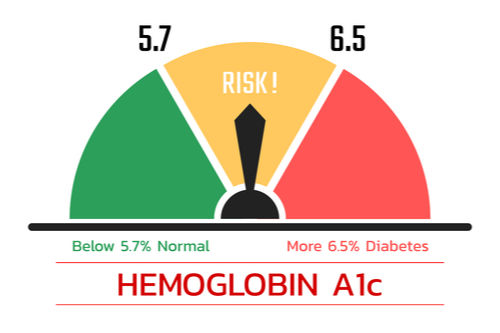Diabetes Management
Are You at Risk for Diabetes? This Simple Test Can Tell
3 min read
By Apollo 24|7, Published on - 27 May 2022, Updated on - 11 December 2023
Share this article
0
0 like

Glucose build-up in the blood can be extremely harmful as it can damage the vessels that supply blood to vital organs, thereby increasing the risk of heart disease, stroke, kidney disease, and nerve problems. Physicians often recommend an HbA1c test to assess their role in the early diagnosis of diabetes. The article explains the important aspects of this key test in detail below.
What is the HbA1C test?
A haemoglobin A1c (HbA1c) test is a simple blood test that measures your average blood glucose levels over the past two to three months. It is different from a glucometer or finger-prick test that tells your current blood glucose levels. Higher HbA1c levels mean you have too much glucose (sugar) in your blood, which can increase the risk of health complications associated with diabetes, such as cardiovascular disease, kidney disease, and nerve damage.
How Does it Work?
The HbA1c test works by measuring the average amount of glycated haemoglobin in your bloodstream over the past three months. Glycated haemoglobin is formed when the excess glucose in your blood attaches itself to the haemoglobin (oxygen-carrying proteins found in red blood cells). Since the red blood cells have a lifespan of only 3 months, the test reveals average values for that duration only. However, if your glucose levels have been elevated over recent weeks, your HbA1c test results will be higher.
Who Needs It?
The HbA1c test is generally used to diagnose prediabetes and diabetes. It is also used by diabetics to check if their blood glucose levels are under control. A baseline HbA1c test is usually recommended for every adult aged 45 years and above. However, it can also be prescribed to those aged below 45 years if they have one or more of the following risk factors:
- Are overweight
- Have hypertension
- Have cardiovascular disease
- Are physically inactive
The frequency of HbA1c tests for those who have already been diagnosed with diabetes depends on certain factors such as:
- Type of diabetes (type 1 or 2)
- Blood glucose levels
- Existing treatment plan
How To Prepare For A HbA1C Test?
Unlike a glucometer or finger-prick test, you don’t have to fast overnight before the test. The test doesn’t require any special preparation. However, if the test is being conducted alongside other diagnostic tests, then you may have to prepare for those tests. Ask your physician to know more.
Interpreting Test Results
The normal ranges of haemoglobin A1c levels are:
- Normal: not more than 5.7%
- Prediabetes: between 5.7% and 6.4%
- Diabetes: 6.5% or higher

Factors That May Affect HbA1C Test Results
Certain medical conditions can cause deviation in your HbA1c test results. Some of these conditions are:
- Severe anaemia
- Liver disease
- Kidney failure
- Sickle cell anaemia
- Thalassemia
- Blood loss or blood transfusions
- Pregnancy

Other factors that may impact your test results are high cholesterol levels and the use of vitamin C and E supplements.
HbA1c test is a key diagnostic test that is mostly used to diagnose and monitor diabetes in a person. The test works by measuring the amount of glucose attached to the haemoglobin protein in red blood cells. Unlike the finger prick test, the HbA1c test can help reveal your average blood glucose levels for the last 3 months. Conditions like anaemia, kidney failure, and liver disease can impact the results. Therefore, it is recommended to share the test report with a physician who may prescribe additional tests to get a better picture.
You can also try the Apollo 24|7 Diabetes Self-Management Tool to log your sugar values, track patterns, know all about food nutrition and more.
Diabetes Management
Consult Top Diabetologists
View AllLeave Comment
Recommended for you
%20(2).jpg?tr=q-80)
Diabetes Management
What is an Oral Glucose Tolerance Test: A Comprehensive Guide
An OGTT is more than just a standard medical procedure. It's a powerful tool to assess how well your body manages glucose, aiding in diagnosing conditions like prediabetes and diabetes. Understanding this test, from its purpose and preparation to interpreting the results, is one step towards a healthier life.
.jpg?tr=q-80)
Diabetes Management
Barriers to Diabetes Care In Low-Income Communities
Understanding the barriers to effective diabetes care in low-income communities is crucial for improving health outcomes. Factors like insufficient knowledge, limited healthcare facilities, financial constraints, fragmented services, cultural misconceptions, medication adherence issues, and lack of supportive systems need addressing. Joining comprehensive programmes like Apollo Super 6 can help navigate these challenges and manage diabetes effectively.

Diabetes Management
Diabetes, Smoking, and Your Health: Understanding the Connection
Smoking and diabetes - are two health risks that when combined, can lead to severe complications. Nicotine in cigarettes can raise blood sugar levels, worsening diabetes control. Quitting smoking, though challenging, is crucial in managing diabetes. It's a journey of small, consistent steps towards a healthier lifestyle. Always consult your doctor for personalised advice based on your health history.
Subscribe
Sign up for our free Health Library Daily Newsletter
Get doctor-approved health tips, news, and more.
Visual Stories

8 Fruits That are Incredibly Healthy for Diabetes
Tap to continue exploring
Recommended for you
%20(2).jpg?tr=q-80)
Diabetes Management
What is an Oral Glucose Tolerance Test: A Comprehensive Guide
An OGTT is more than just a standard medical procedure. It's a powerful tool to assess how well your body manages glucose, aiding in diagnosing conditions like prediabetes and diabetes. Understanding this test, from its purpose and preparation to interpreting the results, is one step towards a healthier life.
.jpg?tr=q-80)
Diabetes Management
Barriers to Diabetes Care In Low-Income Communities
Understanding the barriers to effective diabetes care in low-income communities is crucial for improving health outcomes. Factors like insufficient knowledge, limited healthcare facilities, financial constraints, fragmented services, cultural misconceptions, medication adherence issues, and lack of supportive systems need addressing. Joining comprehensive programmes like Apollo Super 6 can help navigate these challenges and manage diabetes effectively.

Diabetes Management
Diabetes, Smoking, and Your Health: Understanding the Connection
Smoking and diabetes - are two health risks that when combined, can lead to severe complications. Nicotine in cigarettes can raise blood sugar levels, worsening diabetes control. Quitting smoking, though challenging, is crucial in managing diabetes. It's a journey of small, consistent steps towards a healthier lifestyle. Always consult your doctor for personalised advice based on your health history.


